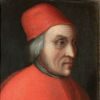Marsilio Ficino

Marsilio Ficino
Marsilio Ficinowas an Italian scholar and Catholic priest who was one of the most influential humanist philosophers of the early Italian Renaissance. He was also an astrologer, a reviver of Neoplatonism in touch with every major academic thinker and writer of his day and the first translator of Plato's complete extant works into Latin. His Florentine Academy, an attempt to revive Plato's Academy, had enormous influence on the direction and tenor of the Italian Renaissance and the development of European...
NationalityItalian
ProfessionPhilosopher
Date of Birth19 October 1433
CountryItaly
The fate of the poor shepherd, who, blinded and lost in the snow-storm, perishes in a drift within a few feet of his cottage door, is an emblem of the state of man.
Everyone believes that he abounds in wisdom, but is short of money.
The doctors of antiquity have affirmed that love is a passion that resembles a melancholy disease. The physician Rasis prescribed, therefore, in order to recover, coitus, fasting, drunkenness, and walking.
Wealth begins . . . in giving on all sides by tools and auxiliaries the greatest possible extension to our powers; as if it added feet and hands and eyes and blood. . . .
Never worry about anything. Live in the present. Live now. Be happy.
[The imagination] . . . inspires an audacious mental habit. We are as elastic as the gas of gunpowder, and . . . a word dropped in conversation, sets free our fancy, and instantly our heads are bathed with galaxies, and our feet tread the floor of the Pit.
Artists in each of the arts seek after and care for nothing but love.
He tastes nothing who has not tasted for himself
The ideas of things intellectually known pass into the substance of the intellect much more than do foods into the substance of the body.
The soul exists partly in eternity and partly in time.
Books that distribute things... with as daring a freedom as we use in dreams, put us on our feet again.
. . . the poor man, whom the law does not allow to take . . . a pair of shoes for his freezing feet, is allowed to put his hand into the pocket of the rich, and say, You shall educate me. . . .
Why do we think love is a magician? Because the whole power of magic consists in love. The work of magic is the attraction of one thing by another because of a certain affinity of nature.
In these times I don't, in a manner of speaking, know what I want; perhaps I don't want what I know and want what I don't know.